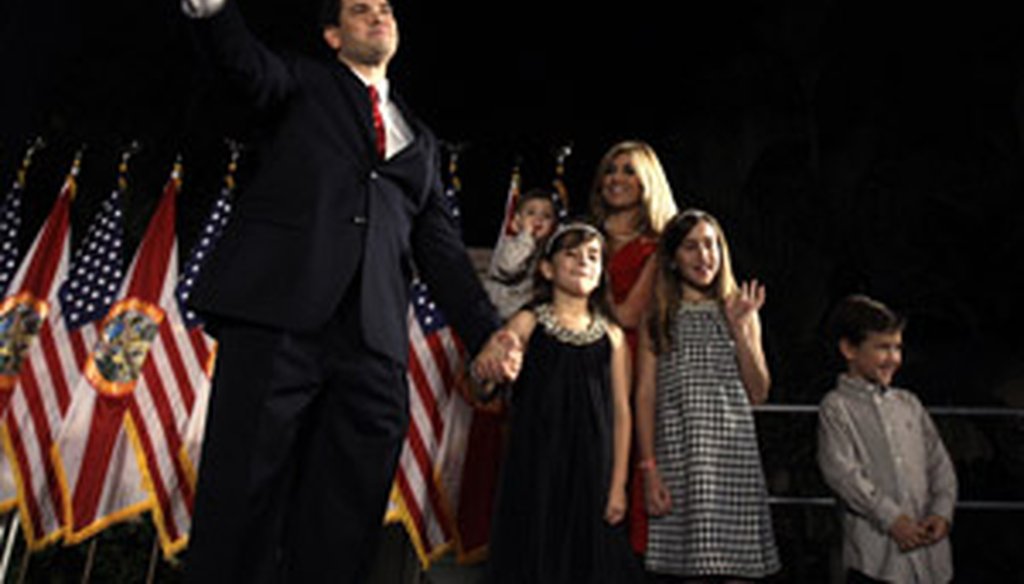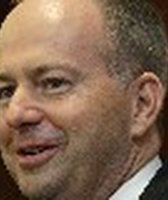Get PolitiFact in your inbox.

Senator-elect Marco Rubio and his family wave to supporters Tuesday night in Miami.
After leading in the polls for months, Republican Marco Rubio handily won election Nov. 2, 2010, to become Florida's next U.S. senator. Here's a look back through our fact-checking eyes at what he said, and what others said about him.
Rubio's two years as state House speaker were critical both in his claims and the criticism that came his way in the campaign against Democrat Kendrick Meek and no-party Gov. Charlie Crist.
• He claimed, for example, that when he was speaker, the House proposed leaner budgets than Crist. We examined the 2007 and 2008 budgets to see who could stake the better claim to being a fiscal conservative. In 2007, Rubio was right by just a hair: The House budget was about $500 million less than the governor's proposal, out of a $70 billion total. The difference was much more noticeable in 2008, about $5 billion lower. We gave Rubio a Mostly True for that one.
• We looked at a pair of earmark complaints that Crist leveled, that Rubio supported putting aside $800,000 to add AstroTurf on a field in Miami where he played flag football, and that he included $1.5 million in the budget for a "rowing institute." We said Half True on the AstroTurf question. The dollar figure is correct and Rubio did vote for it. But he wasn't the main sponsor, nor is it clear he knew the details of the artificial turf.
The rowing institute, we found, involved a ramp and boathouse along a Water Management District canal in Central Florida. We ruled it Pants on Fire because Rubio wasn't the sponsor, didn't push it and gained no clear benefit from it. Nor did he sneak it into the budget; it was clearly labeled as money to "facilitate use as a rowing training center."
• Speaking of money, we looked at another Crist claim that Rubio's personal income soared when he joined the state House. In fact, that was the governor's first attack ad of the Senate campaign back in March 2010. We said True. Rubio was elected to the House in 2001 and reported income that year of just under $90,000. When he ended his term as speaker in 2008, his reported income was $414,000.
• Another Crist attack late in the campaign, that Rubio changed his position about an auto insurance proposal after selling his home to a chiropractor who was lobbying him, rated a Barely True. The sale was actually to the chiropractor's mother, a retiree who wanted to live near her son. And Rubio did not alter his position immediately. He stood his ground and the proposal failed in the regular legislative session. It wasn't until months later, after changes were made in the bill, that Rubio agreed and it passed.
• Turning to national issues, Rubio was attacked for putting changes to Social Security on the table. He said he did so responsibly, proposing that current retirees and those within 10 years of retirement would not be affected. We gave Crist a Half True on that one.
• Rubio received a Mostly True for his claim that ending federal earmarks could save U.S. taxpayers $15 billion to $20 billion a year. Different groups come up with slightly different numbers, but he was close enough.
• When Rubio engaged in an amusing series of videos with MSNBC's Rachel Maddow about tax cuts and the deficit, we gave her a Mostly True for saying Rubio's economic proposals would add $3.5 billion to the deficit.
• Rubio got a solid True for recognizing that "forty cents of every dollar spent" by the U.S. government comes from borrowed money.
• We looked at other financial issues too, because so many voters are concerned with the economy. The AFL-CIO accused Rubio of opposing the extension of unemployment benefits. We said Half True. He said he was opposed to them, but with a caveat: He wanted to see other cuts to pay for them, which was the main Republican argument in Congress. When Crist accused Rubio of saying he would have accepted stimulus money, we found that Mostly True. Rubio did say in a TV interview that he "would have accepted those portions of the money that would not have put Florida in a worse position off in the future than it is right now."
• Immigration was also a significant issue this election, and Rubio brings a personal viewpoint to the topic as the son of Cuban-born parents. In January 2010, discussing immigration on the radio with Glenn Beck, Rubio said that nearly half the people who were in the United States illegally had entered legally but overstayed their visas. Several respectable studies back up that percentage, and we gave Rubio a Mostly True. In May, during the heat of the controversy over Arizona's hard-line immigration law, we tested Rubio's consistency in his comments on the law with the Flip-O-Meter. Arizona's law was amended, and Rubio said he would have voted against the first version and for the second version. We gave him a Half Flip for that.
We had much more on Rubio during this long campaign, including 11 True or Mostly True, eight Half or Barely True, and five False or Pants on Fire rulings. We will be following him as he assumes his Senate seat as well.
Our Sources
See individual Truth-O-Meter rulings.



























